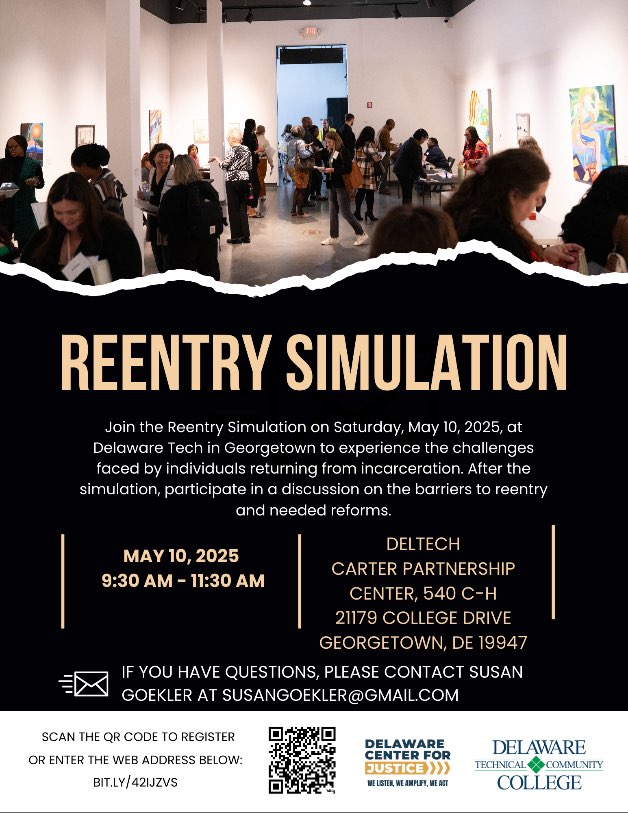Reentry Simulation at Delaware Technical Community College

In Delaware, 3,468 men and women are in prison after conviction for crimes and 1,067 are in pre-trial detention awaiting trial. 1 Upon release, Delaware’s prisoners face a challenging environment at every level that often prevents them from becoming productive members of society. Post-incarceration, many Delawareans have difficulty getting a job especially if they have limited education and work experience. Ex-prisoners who have served lengthy sentences face technological advances that are essential in new job markets and often lack the training to make them viable candidates.
Many ex-prisoners face systemic challenges inherent in Delaware’s parole system, and prejudices that continue even after they have “paid their debt to society.” Within three years of release, 60 percent of Delaware’s inmates will be rearrested, reconvicted, or reimprisoned. Delaware has one of the highest recidivism rates in the United States.2 Recidivism – the re-arrest, reconviction, or re-incarceration of an ex-offender – harms both families and society.
To understand the challenges Delawareans face when they leave prison and why the recidivism rate is so high, come to a Reentry Simulation and experience first-hand an immersive experience of “walking a mile in a newly-released prisoner’s shoes.” You will have a chance to debrief and share your experiences, discuss barriers to reentry and reintegration, and learn how you can support Second Chances and people returning to our communities.
On May 10, several groups will host and facilitate this reentry simulation. The simulation will take place from 9:30 to 11:30 a.m. in the Carter Partnership Center (Building #5) on the Delaware Technical and Community College campus at 21179 College Drive in Georgetown.
Volunteers from the Southern Delaware Alliance for Racial Justice (SDARJ), Unitarian Universalists of Southern Delaware (UUSD), The Way Home, Partnership in Reentry Coalition of Delaware (PIRCOD), Link of Love, ACLU-DE Smart Justice Ambassadors, and the Delaware Center for Justice (DCJ), several service providers, and justice-involved community members will help facilitate the simulation and debriefing.
The simulation will illustrate the journey of formerly incarcerated men and women to self-sufficiency and the barriers that may contribute to feelings of helplessness and decreased self-efficacy. Participants will assume the role of an ex-offender and perform tasks in four 15-minute sessions with each session representing a week. They will encounter challenges faced by many ex-offenders as they try to complete their court-ordered obligations as well as maintain their day-to-day life.
For more information, contact Susan Goekler at socialjustice@uussd.org
1 Delaware Department of Corrections, Delaware Population Summary, https://doc.delaware.gov/, April 13, 2025.
2 World Population Review, Recidivism Rates by State 2024, https://worldpopulationreview.com-state-rankings/recidivism-rates-by-state,





